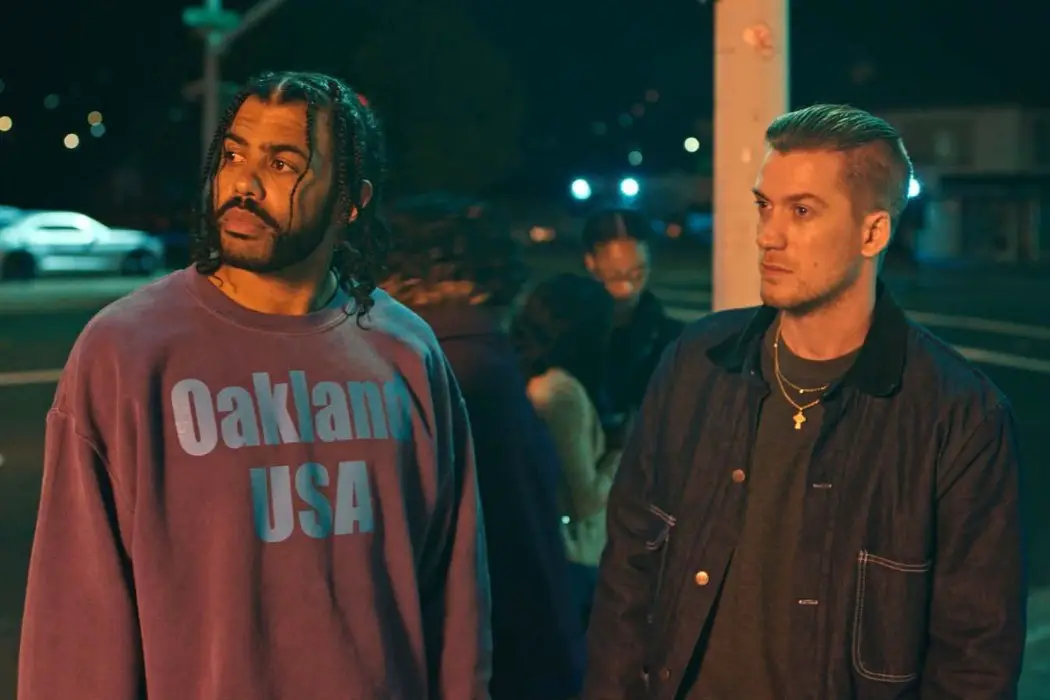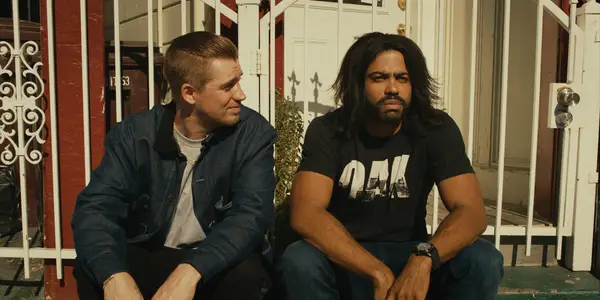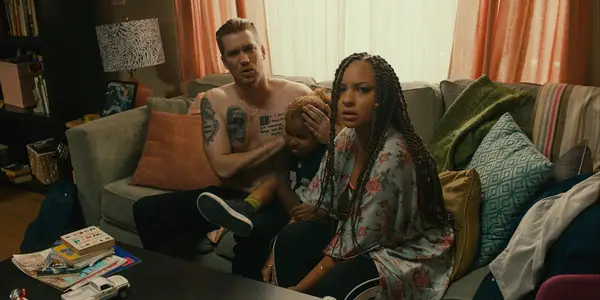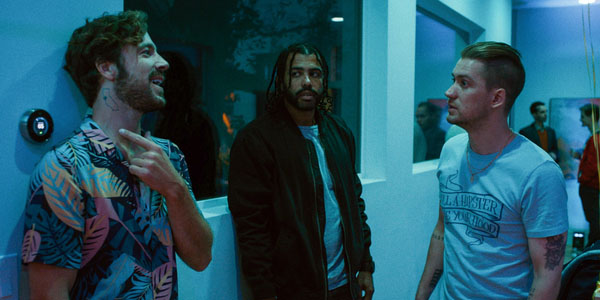BLINDSPOTTING: A Poem About Modern Police Brutality

Adriana is Georgia born, North Carolina raised, and now California…
The city of Oakland seems to be having a spectacular year. In February, the record-shattering Black Panther was released, and in June, Boots Riley‘s monumental directorial debut, Sorry to Bother You, was unleashed on audiences. As July comes to a close, another crowning achievement with Oakland at its center is released: Blindspotting. Originally opening to rave reviews at this years Sundance Film Festival, Blindspotting is one of the year’s best films.
A riveting directorial debut by Carlos López Estrada, and written by (and starring) Daveed Diggs and Rafael Casal, Blindspotting is one of today’s boldest takes on race relations in America. While police brutality has been occurring for years, the effects of our current climate have recently began to trickle into cinema. A truly powerful masterpiece, Blindspotting infuses loud visuals, spoken verse, and the backdrop of Oakland to relay its message.

Everyone involved puts their all into this film. With awards season quickly approaching, Blindspotting is earning strong acting and screenplay awards consideration for both Daveed Diggs and Rafael Casal. Hopefully in the coming months, Blindspotting is still fresh on everyone’s minds and earns the accolades it deserves.
A poem about Oakland’s past, present, and future
From the opening sequence to the end, Blindspotting focuses on the rapid transformation of Oakland. Like the rest of the Bay Area, Oakland finds itself the center of the gentrification debate with skyrocketing rents and the displacement of longtime natives. Blindspotting opens with a split-screen, the left focusing on an altered view of Oakland filled with hipsters, Wholefoods markets, and Warriors fans. Everyone seems to exist without a care, enjoying their new home. The right side focuses on the more honest side of Oakland- a city filled with poverty, Raiders fans, and sketchy convenience stores. Oakland’s original residents are diverse, hardworking, and love the city in all its imperfections.
The film follows two friends Collin (Daveed Diggs) and Miles (Rafael Casal) as they navigate their way through a gentrifying Oakland. Collin and Miles spend their days moving people in and out of their homes. Collin merely tries to get through each day before his probation is over. Eager to turn a new leaf, Collin is trying to let the past go. Miles is a bonafide trouble maker with something to prove. Loud-mouthed and wild, Miles doesn’t focus on the consequences of his actions- often compromising the feelings and safety of his girlfriend Ashley (Jasmine Cephus Jones) and their son.

As Miles and Collin move people in and out of homes, they come across mementos from the past. In one home the meet a photographer who documents the residents of Oakland displaced by gentrification. Many are people of color, and varying ages. In another home, the two are conned into doing a cleanup job. Collin finds photos of a family long gone. Her raps about what’s left behind.
Rebuilding communities is a good thing, but Blindspotting focuses on the ignorance of transplants as they enter “new” spaces. The residents appreciate the curated Oakland that’s safe and hip. They don’t know Oakland, but act as if they do.
Race relations are worse than ever, and Blindspotting highlights it
The film centers around Collin’s remaining three days on probation. Looking forward to his freedom, Collin is trying his hardest to keep out of trouble. His probation is put in danger when he witnesses a police officer (Ethen Embry) shoot a black man in the back four times. After the incident, Collin is shaken up and afraid for his life. Petrified by his experience, Collin has dreams and visions inspired by the shooting. In one of the most memorable sequences from the film, Collin runs through a cemetery. While there, he has a vision of the men and women killed by police brutality. They are all wearing black hoodies, and stand with their heads down. Out of the victims, Collin sees the man he saw die in the street. He stands there, a pained look on his face – the blood still fresh on his white shirt.
Throughout the film, there are instances pointing toward the flaws in our society. Early in the film, Miles yells at a man to move his car out the way. In a fit of anger, Miles starts cursing and honking the horn. Later on Collin’s boss and ex-girlfriend Val (Janina Gavankar) comments on a complaint from the same man- blaming Collin for the incident. Val also suggests Collin dispose of his braids – but he declines, stating it as part of his identity.

A horrifying element of Blindspotting is the relationship between Collin and Miles. They are good friends, but their differences become more evident as time roles by. Miles is more of a hothead and troublemaker than Collin, yet he isn’t the one who went to jail or faces any repercussions. He also constantly expects Collin to be on his side- even if what he is doing endangers them both. In a pivotal scene, Collin tells Miles that he is the person that they (the police/establishment) expect Collin to be. Collin is obsessed with being accepted as part of the real Oakland, he doesn’t realize the harm he’s caused.
(Spoilers ahead)
In the climax of the film, Collin finds himself in the house of the police officer who murdered. Realizing where he is, Collin finds the man in the basement. Overcome with anger, Collin holds a gun to him in an act of revenge. Collin never shoots, but decides to instill fear in his heart. Collin spontaneously raps about his pain, a surreal moment, but poignant nonetheless. In many films a random burst of lyrics wouldn’t be fitting, but spoken verse is a powerful way to exorcise emotions. It works perfectly in this instance. The film ends on a bittersweet note. Collin admits that he is not “good” when Miles asks.
Blindspotting leaves viewers solemn and uncomfortable
Blindspotting doesn’t truly reach a happy ending. Some reviewers have called the film a buddy comedy, but it couldn’t be farther from the truth. Blindspotting does have its lighthearted comedic moments, but its intention is not to make you laugh. At the conclusion of the film, I felt heavy. It ends on a light note, but the weighty message is still felt long after it’s over. As I left the theater, I felt the discomfort from the audience. Blindspotting forces you to pay attention to the bigger picture.
It may make you uncomfortable, but that’s the main point of the film – to get you to think about your surroundings. Like its name implies, the film lets us know that often we don’t see the whole picture, but whatever is presented to us first. Like the image of the Rubin face. Many people see the vase first, and others the face… but never both at once.
How do you feel about the message that Blindspotting sends? And how do you feel about the incorporation of spoken verse?
Beginning July 27th, Blindspotting is playing in limited theaters across the US. For more release information, you can view the IMDB page.
Does content like this matter to you?
Become a Member and support film journalism. Unlock access to all of Film Inquiry`s great articles. Join a community of like-minded readers who are passionate about cinema - get access to our private members Network, give back to independent filmmakers, and more.
Adriana is Georgia born, North Carolina raised, and now California surviving. A fashion school defector, Adriana now spends her a lot of her time writing about film and life. Some of her other passions include solo travel, food, and bargain shopping. Her work has been seen on sites such as Film Inquiry, Film School Rejects, Reel Honey, and CC2K. You can see her more of her work on thecinemasoloist.com.













